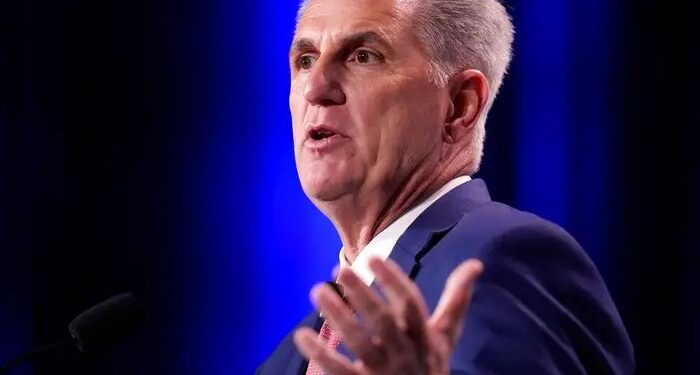- Rep. Kevin McCarthy has lost six rounds of voting for House Speaker as of Wednesday night.
- But McCarthy — or the 20 Republican holdouts — don’t appear close to conceding.
- Here are five ways the battle for House Speaker could potentially end.
The battle for speaker in the new Republican-controlled US House of Representatives was set to drag out into a third day after the chamber adjourned on Wednesday evening.
About 20 Republicans have held out from supporting Rep. Kevin McCarthy, who failed to win a majority after six rounds of voting. The GOP’s slim majority in the House means McCarthy needs the support of nearly all Republicans to become speaker.
But the group of Republicans protesting McCarthy doesn’t appear to be giving in, and how exactly the whole ordeal will end is up in the air.
“If you can imagine a scenario where both sides are able to claim victory, that’s the one you’d probably put your chips on,” Kevin Kosar, a senior fellow at the American Enterprise Institute who studies Congress and US politics, told Insider. “But it’s not clear what that looks like.”
Here are five potential ways the battle for House Speaker could end, with or without McCarthy assuming the position.
McCarthy gives GOP holdouts what they want
The group of lawmakers opposing McCarthy has made a number of demands that they would like to see in the new Congress, including rules changes that would give more power to individual members.
McCarthy tentatively agreed to some, including expanding the rights of members to “motion to vacate the chair,” which would essentially allow a handful of members to force a chamber-wide “no confidence” vote for the speaker. But some Republicans want the motion to be expanded even further to allow one member to force such a vote, as was the case before House Speaker Nancy Pelosi weakened the motion in 2019.
It’s unclear what other concessions McCarthy could make to shore up support from those opposing him. But some, including Rep. Matt Gaetz of Florida, have suggested there’s little McCarthy could do to earn their vote.
McCarthy bows out and a consensus speaker is selected
After six votes, McCarthy seems set on becoming speaker. But it’s possible the representative from California could withdraw if “he thinks he can’t win or he sees support eroding with additional votes,” Kosar said.
It’s unclear how long McCarthy would be willing to draw out the voting, but his support has dwindled slightly since the first vote on Tuesday when only 19 Republicans voted against him.
During the final vote on Wednesday, 20 Republicans voted for Rep. Byron Donalds.
McCarthy cuts a deal with Democrats
McCarthy could theoretically come to a deal with Democratic leadership in which some members of their party cross lines and support his bid for speaker. However, thus far Democrats have not signaled any willingness to step in.
When asked Wednesday if Democrats could intervene, Rep. Nancy Pelosi said: “This is a problem of their own making. This is called leadership. They should be able to work it out. Don’t put this at the Democrats’ doorstep.”
Cooperating with Democrats could also hurt McCarthy in the long run.
“The Freedom Caucus response will be, ‘Oh my God, Kevin McCarthy schemed with Democrats,'” Kosar said, adding the Democrats could also hold it over on McCarthy that they had to do him a favor because he couldn’t become speaker without them.
Members stop showing up as the vote drags on, lowering the majority threshold
McCarthy needs to win a majority of the present members’ votes in order to be elected speaker. That means if some members stop showing up, which becomes more likely the longer the voting drags on, he could potentially be elected speaker even without the support of his whole party.
House changes the rules to push McCarthy through
The House could also in theory change the rules of voting for speaker. For instance, McCarthy could make a motion to say that only a plurality is needed to become speaker, meaning whoever gets the most votes would become speaker even if they do not earn a majority of votes.
If such a motion passed, that could scare enough Republicans into backing McCarthy in order to avoid a Democrat becoming speaker. Rep. Hakeem Jeffries the House Minority Leader for the Democrats has consistently been getting 212 votes.
Kosar said such an outcome was “fanciful,” although technically possible.
Source: I N S I D E R



Recent Comments